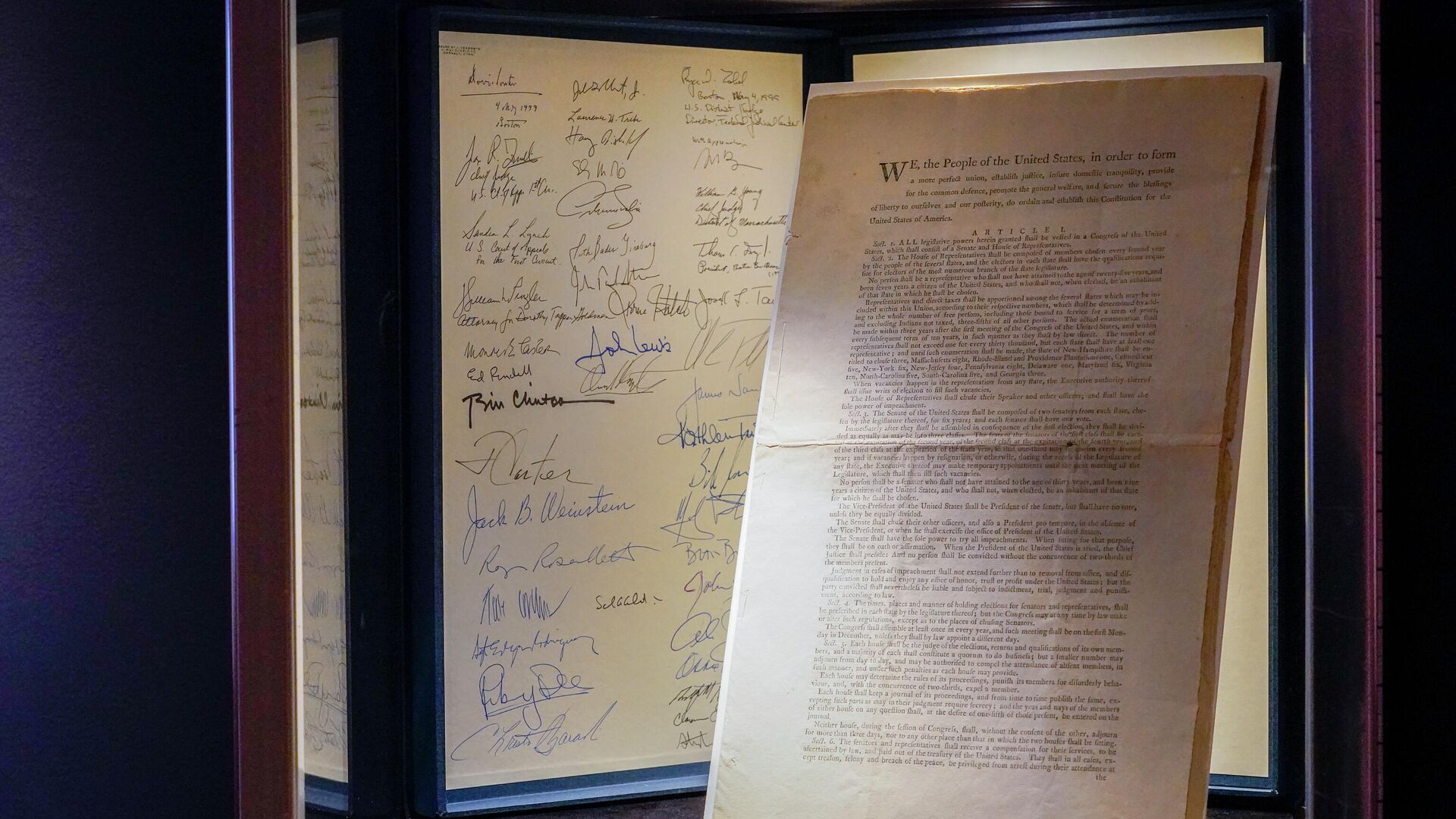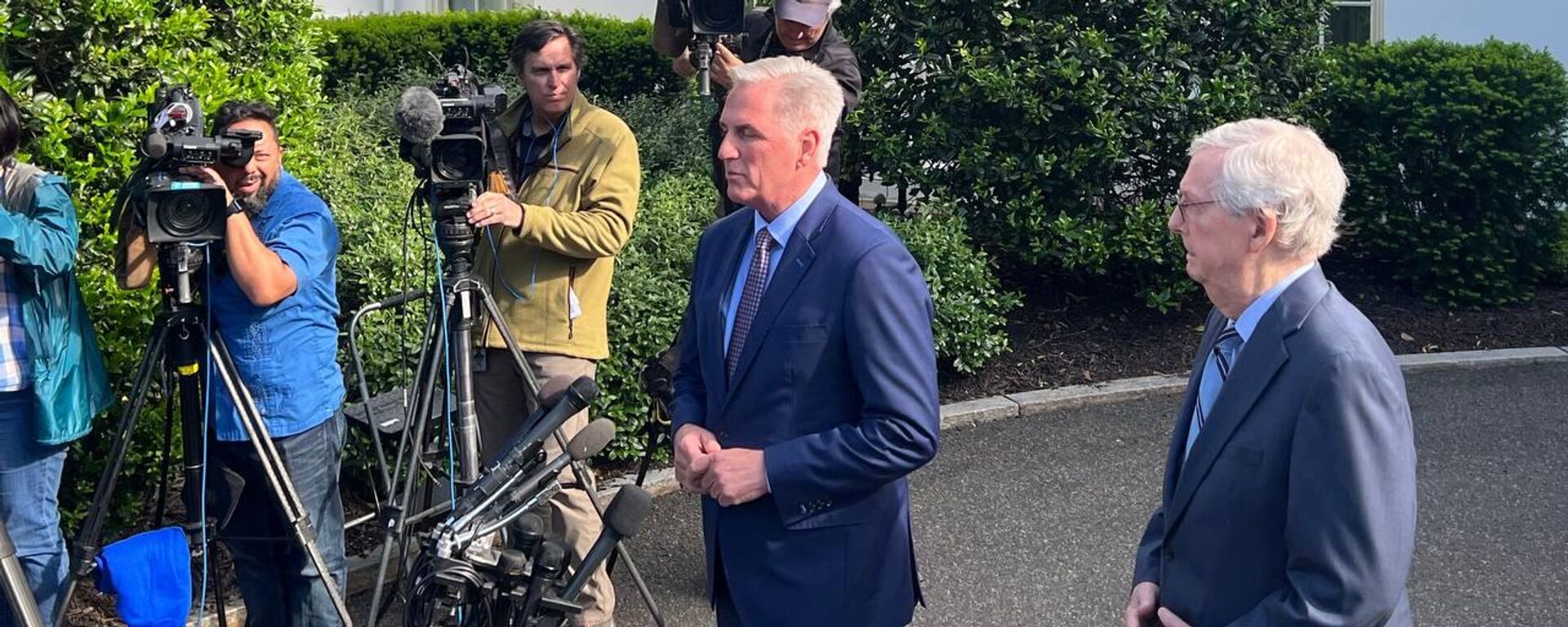https://sputnikglobe.com/20230511/basic-guide-to-the-us-14th-amendment-1110270793.html
Basic Guide to the US' 14th Amendment
Basic Guide to the US' 14th Amendment
Sputnik International
Section Four is what essentially makes the Fourteenth Amendment the focus of debates in the context of the US public debt ceiling, stating that "the validity of the public debt of the United States ... shall not be questioned."
2023-05-11T19:05+0000
2023-05-11T19:05+0000
2023-05-11T19:09+0000
sputnik explains
us debt ceiling crisis
us debt
public debt
us constitution
https://cdn1.img.sputnikglobe.com/img/07e5/0b/16/1090939629_0:160:3073:1888_1920x0_80_0_0_865e97f735e44c53d4bacad485d6446c.jpg
While the US Treasury Department already warned that the federal government may start defaulting on its debt at the beginning of next month, some scholars and media outlets pointed at a particular amendment to the US Constitution that may supposedly allow the US president to resolve this crisis in one fell swoop.So what exactly is this Amendment XIV to the US Constitution and why has it attracted so much attention as of late?When Was the Fourteenth Amendment Adopted?The 14th Amendment to the US Constitution was adopted in 1868, three years after the end of the American Civil War, and was directly related to the aftermath of that internecine conflict as it effectively extended citizenship rights to previously enslaved people.What is the Fourteenth Amendment?The 14th Amendment to the US Constitution comprises of five sections, four of which, however important they are in the context of the fabric of the American legislation and statehood, are less important to the matter of public debt.Specifically, Section One deals with the matter of citizenship, proclaiming that all people born or naturalized in the US “are citizens of the United States and of the State wherein they reside.”“No State shall make or enforce any law which shall abridge the privileges or immunities of citizens of the United States; nor shall any State deprive any person of life, liberty, or property, without due process of law; nor deny to any person within its jurisdiction the equal protection of the laws,” states Section One.Section Two deals with the matter of the US states' representation in Congress, stipulating that, if a state were to violate its citizens' right to vote, that state's representation might be reduced.Section Three states that a person who "engaged in insurrection or rebellion” against the US after taking an oath as a US officer or a Congress member may not be elected as member of congress or as president, “or hold any office, civil or military, under the United States."And Section Five effectively provides the US congress with the power to enforce the provisions of the amendment.What is Section Four?Section Four is what essentially makes the Fourteenth Amendment the focus of debates in the context of the US public debt ceiling.Section Four states in no uncertain terms that "the validity of the public debt of the United States, authorized by law, including debts incurred for payment of pensions and bounties for services in suppressing insurrection or rebellion, shall not be questioned."This wording led some scholars, such as University of Toledo College of Law Professor Rebecca Zietlow, to suggest that the Fourteenth Amendment’s Section Four may offer a "constitutionally tenable" way to resolve the debt ceiling crisis.This issue, however, remains a matter of debate in the United States: while the prospects of using the Fourteenth Amendment to deal with the debt ceiling had been mulled before, the US government has so far refrained from using that option.Last week, US Treasury Secretary Janet Yellen also warned that resorting to the use of the 14th Amendment in the context of the debt ceiling may lead to a "constitutional crisis.""There is no way to protect our financial system in our economy, other than Congress doing its job and raising the debt ceiling and enabling us to pay our bills and we should not get to the point where we need to consider whether the president can go on issuing debt," she told media.At the same time, recent media reports suggest that the current US president, Joe Biden, said that he is considering using the 14th Amendment to deal with the debt ceiling issue.
https://sputnikglobe.com/20230509/gop-leaders-reveal-no-new-movement-after-debt-ceiling-talks-but-vow-us-wont-default-1110226166.html
Sputnik International
feedback@sputniknews.com
+74956456601
MIA „Rossiya Segodnya“
2023
News
en_EN
Sputnik International
feedback@sputniknews.com
+74956456601
MIA „Rossiya Segodnya“
Sputnik International
feedback@sputniknews.com
+74956456601
MIA „Rossiya Segodnya“
why is the 14th amendment important, 14th amendment, 14th amendment text, what did the 14th amendment do, what is the fourteenth amendment, fourteenth amendment, what is the 14th amendment on debt, what is the 14th amendment debt ceiling, what is the 14th amendment in simple terms, what is the 14th amendment of the united states, what is the 14th amendment used for, fourteenth amendment to the united states constitution, 14th amendment debt, 14th amendment simplified, 14th amendment debt ceiling, 14th amendment to the constitution, 14th amendment debt clause
why is the 14th amendment important, 14th amendment, 14th amendment text, what did the 14th amendment do, what is the fourteenth amendment, fourteenth amendment, what is the 14th amendment on debt, what is the 14th amendment debt ceiling, what is the 14th amendment in simple terms, what is the 14th amendment of the united states, what is the 14th amendment used for, fourteenth amendment to the united states constitution, 14th amendment debt, 14th amendment simplified, 14th amendment debt ceiling, 14th amendment to the constitution, 14th amendment debt clause
Basic Guide to the US' 14th Amendment
19:05 GMT 11.05.2023 (Updated: 19:09 GMT 11.05.2023) The deadline for raising the current US public debt ceiling draws closer with each passing day while lawmakers in the country still cannot overcome their differences in order to stave off the prospects of default.
While the US Treasury Department already warned that the federal government may start
defaulting on its debt at the beginning of next month, some scholars and media outlets pointed at a particular amendment to the US Constitution that may supposedly allow the US president to resolve
this crisis in one fell swoop.
So what exactly is this Amendment XIV to the US Constitution and why has it attracted so much attention as of late?
When Was the Fourteenth Amendment Adopted?
The 14th Amendment to the US Constitution was adopted in 1868, three years after the end of the American Civil War, and was directly related to the aftermath of that internecine conflict as it effectively extended citizenship rights to previously enslaved people.
What is the Fourteenth Amendment?
The 14th Amendment to the US Constitution comprises of five sections, four of which, however important they are in the context of the fabric of the American legislation and statehood, are less important to the matter of public debt.
Specifically, Section One deals with the matter of citizenship, proclaiming that all people born or naturalized in the US “are citizens of the United States and of the State wherein they reside.”
“No State shall make or enforce any law which shall abridge the privileges or immunities of citizens of the United States; nor shall any State deprive any person of life, liberty, or property, without due process of law; nor deny to any person within its jurisdiction the equal protection of the laws,” states Section One.
Section Two deals with the matter of the US states' representation in Congress, stipulating that, if a state were to violate its citizens' right to vote, that state's representation might be reduced.
Section Three states that a person who "engaged in insurrection or rebellion” against the US after taking an oath as a US officer or a Congress member may not be elected as member of congress or as president, “or hold any office, civil or military, under the United States."
And Section Five effectively provides the US congress with the power to enforce the provisions of the amendment.
Section Four is what essentially makes the Fourteenth Amendment the focus of debates in the context of the US public
debt ceiling.
Section Four states in no uncertain terms that "the validity of the public debt of the United States, authorized by law, including debts incurred for payment of pensions and bounties for services in suppressing insurrection or rebellion, shall not be questioned."
This wording led some scholars, such as University of Toledo College of Law Professor Rebecca Zietlow, to suggest that the Fourteenth Amendment’s Section Four may offer a "constitutionally tenable" way to resolve the debt ceiling crisis.
"Under Section Four, it is unconstitutional for Congress to default on debt that the United States has already incurred, and arguably unconstitutional for Congress to impose any ceiling on US debt," Zietlow wrote in an article published earlier this month.
This issue, however, remains a matter of debate in the United States: while the prospects of using the Fourteenth Amendment to deal with the debt ceiling had been mulled before, the US government has so far refrained from using that option.
"I can say that this administration does not believe that the 14th Amendment gives the President the power to ignore the debt ceiling – period," Jay Carney, White House Press Secretary during the Obama administration, stated during a press briefing in June 2012.
Last week, US Treasury Secretary Janet Yellen also warned that resorting to the use of the 14th Amendment in the context of the debt ceiling may lead to a "constitutional crisis."
"There is no way to protect our financial system in our economy, other than Congress doing its job and raising the debt ceiling and enabling us to pay our bills and we should not get to the point where we need to consider whether the president can go on issuing debt," she told media.
At the same time, recent media reports suggest that the current US president, Joe Biden, said that he is considering using the 14th Amendment to deal with the debt ceiling issue.


